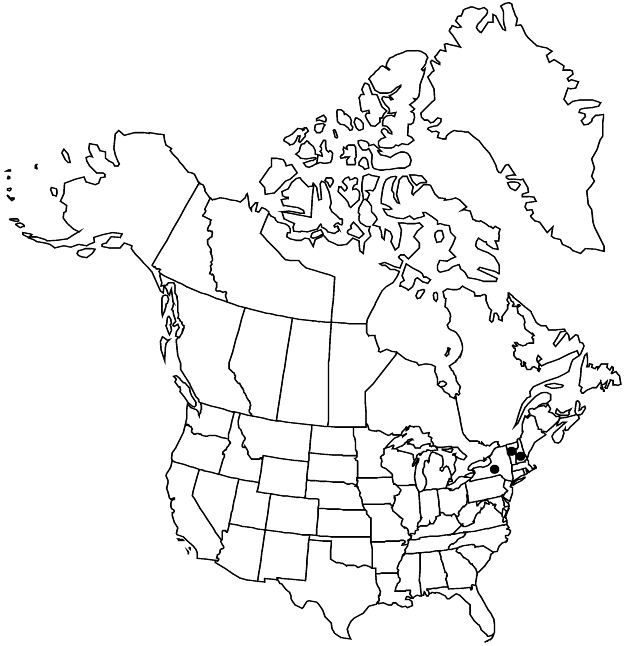Difference between revisions of "Crataegus chrysocarpa var. praecox"
J. Bot. Res. Inst. Texas 1: 1009. 2007.
FNA>Volume Importer |
FNA>Volume Importer |
||
| Line 14: | Line 14: | ||
|name=Crataegus praecox | |name=Crataegus praecox | ||
|authority=Sargent | |authority=Sargent | ||
| + | |rank=species | ||
|publication_title=Rhodora | |publication_title=Rhodora | ||
|publication_place=3: 27. 1901 | |publication_place=3: 27. 1901 | ||
| Line 20: | Line 21: | ||
|name=C. lemingtonensis | |name=C. lemingtonensis | ||
|authority=Sargent | |authority=Sargent | ||
| + | |rank=species | ||
}} | }} | ||
|hierarchy=Rosaceae;Rosaceae subfam. Amygdaloideae;Rosaceae tribe Gillenieae;Crataegus;Crataegus sect. Coccineae;Crataegus (sect. Coccineae) ser. Rotundifoliae;Crataegus chrysocarpa;Crataegus chrysocarpa var. praecox | |hierarchy=Rosaceae;Rosaceae subfam. Amygdaloideae;Rosaceae tribe Gillenieae;Crataegus;Crataegus sect. Coccineae;Crataegus (sect. Coccineae) ser. Rotundifoliae;Crataegus chrysocarpa;Crataegus chrysocarpa var. praecox | ||
| Line 35: | Line 37: | ||
|elevation=100–300 m | |elevation=100–300 m | ||
|distribution=N.H.;N.Y.;Vt. | |distribution=N.H.;N.Y.;Vt. | ||
| − | |discussion=<p>Variety praecox is similar to < | + | |discussion=<p>Variety praecox is similar to <i></i>var.<i> chrysocarpa</i> except for its pink anthers and is sparsely scattered through the eastern part of the range of the species. Reports from Quebec and Wisconsin are unconfirmed. Forms attributed to <i>Crataegus</i> lemingtonensis in Vermont are said to be locally common and represent two variants, the more common like C. praecox and a second with a distinctive leaf shape and relatively slender and long petiole characteristic of members of ser. Tenuifoliae. The latter represents typical C. lemingtonensis and is perhaps a hybrid.</p> |
|tables= | |tables= | ||
|references= | |references= | ||
| Line 44: | Line 46: | ||
-->{{#Taxon: | -->{{#Taxon: | ||
name=Crataegus chrysocarpa var. praecox | name=Crataegus chrysocarpa var. praecox | ||
| − | |||
|authority=(Sargent) J. B. Phipps | |authority=(Sargent) J. B. Phipps | ||
|rank=variety | |rank=variety | ||
| Line 59: | Line 60: | ||
|publication year=2007 | |publication year=2007 | ||
|special status=Endemic | |special status=Endemic | ||
| − | |source xml=https://jpend@bitbucket.org/aafc-mbb/fna-data-curation.git/src/ | + | |source xml=https://jpend@bitbucket.org/aafc-mbb/fna-data-curation.git/src/f50eec43f223ca0e34566be0b046453a0960e173/coarse_grained_fna_xml/V9/V9_1029.xml |
|subfamily=Rosaceae subfam. Amygdaloideae | |subfamily=Rosaceae subfam. Amygdaloideae | ||
|tribe=Rosaceae tribe Gillenieae | |tribe=Rosaceae tribe Gillenieae | ||
Revision as of 22:37, 16 December 2019
Shrubs, 20–30 dm. Leaves: blade ovate to rhombic-ovate, base ± cuneate, sinuses: max LII 15–20%, lobe apex acute, veins 3–5 per side, abaxial surface glabrous young or lamina sparsely hairy at anthesis, veins hairy, adaxial appressed-scabrous, glabrescent. Inflorescences: branches pubescent. Flowers 15–20 mm diam.; hypanthium pubescent; stamens 10, anthers pink. Pomes red, suborbicular, 8–10 mm diam., glabrous.
Phenology: Flowering May; fruiting mid Sep.
Habitat: Open brush, rocky hillsides
Elevation: 100–300 m
Distribution

N.H., N.Y., Vt.
Discussion
Variety praecox is similar to var. chrysocarpa except for its pink anthers and is sparsely scattered through the eastern part of the range of the species. Reports from Quebec and Wisconsin are unconfirmed. Forms attributed to Crataegus lemingtonensis in Vermont are said to be locally common and represent two variants, the more common like C. praecox and a second with a distinctive leaf shape and relatively slender and long petiole characteristic of members of ser. Tenuifoliae. The latter represents typical C. lemingtonensis and is perhaps a hybrid.
Selected References
None.